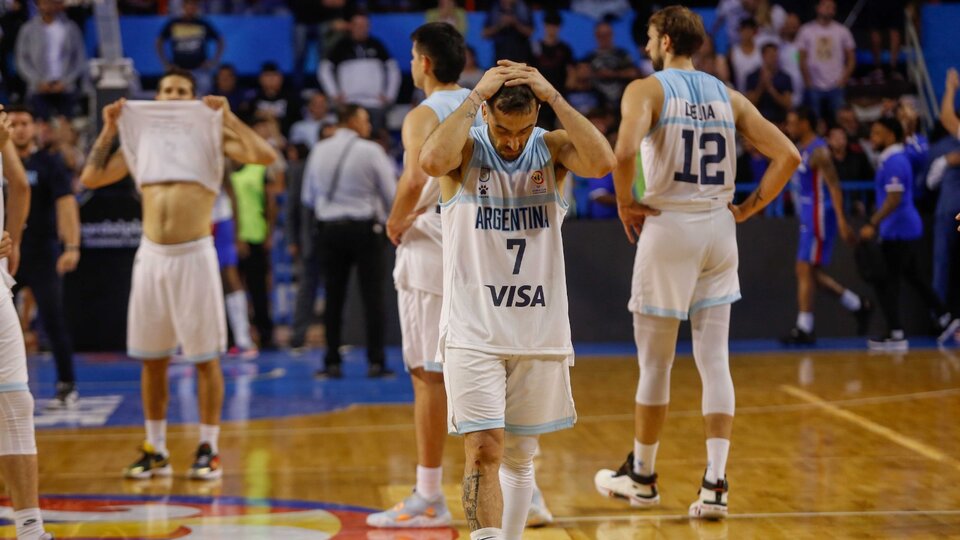You have to go back to Colombia 1982 to find the Argentine National Team out of a Basketball World Cup. To measure it, it is possible to remember that 40 years have passed, the birth, heyday and closing of the Golden Generation, two Olympic medals, two world runner-ups and countless continental podiums. For this reason, not accessing a contest for which there were seven places cannot be classified in any other way than a resounding failure. The 79-75 final on Sunday against the Dominican Republic was the last link in a chain that seemed more than fragile and ended up being cut at the least expected moment.
The commitment shown and the public’s affection for a group of players who gave ample displays of pride, courage and ability does not exempt this team from the responsibilities of a very painful elimination and which may have another cost in the future: access to the Olympic Games Paris 2024 will be much more complicated, taking into account that the natural route through the World Cup is already ruled out. But the sporting failure of the team is just the tip of the iceberg of a structure that has been falling apart for years and that only good results ended up making up and sustaining.
That said, a team that was winning at home by 17 points with just over 10 minutes to go before the end of the game cannot be released from responsibilities. At this level and with names like Campazzo, Laprovittola, Deck and company on the field, it is unacceptable to miss out on such an opportunity. It is true that the Dominican Republic did their part, risking being almost eliminated and showed their best version in the last quarter, but Argentina collaborated a lot with their own mistakes, with failed individual actions and with collective decisions that did not live up to what was needed.
Nor did the answers appear from the substitute bench. There was no reaction from the coaching staff when the advantage that should have been decisive slipped through their fingers. And neither was it at the end, when the team ran out of goals and there were no suitable executions to score, except through free kicks. To top it off, in front of him was Néstor García, a strategist specialized in risking and moving pieces at decisive moments, who also made the most of the morbidity that his presence at the Mar del Plata Sports Center meant after being fired last year when he was the driver of this process. .
However, staying with what happened on the court would be looking at only a limited part of the story. The reality of Argentine basketball, from the top commanded by Fabián Borro to the different levels that emerge from behind, has been breaking down by leaps and bounds, something that even players and former players like Luis Scola have been expressing in recent years. The squad suffered, with no tickets to bring players from foreign leagues in the first windows, when qualifying was supposed to be a formality and when Néstor García was still the coach. And it continued over time with inadequate logistics for trips abroad, with endless stopovers, connections without much logic and hotels not suitable for elite athletes.
The bases also suffer, with a National League that is experiencing one of its lowest historical moments, with a very poor level of play, with empty stadiums, with almost no broadcasting and with an incomprehensible calendar to attract the public. And even the amateur or formative categories suffer, as happens the women of the First Division of the metropolitan basketball, almost forced to retire at the age of 35 by a rule that prevents more than two older players on the same team or the girls of 12 or 13 years, who jump from minibasketball -under 12 years old- directly to Sub 15, because there are no referees and then the decision was to suppress the intermediate category. They are small details that add up to a host of problems that, if the free shots missed by Laprovittola or Campazzo’s poorly shot triples entered in the final minutes, they could have continued to be hidden. But since they did not enter, they hatched at the worst moment.
Now will be the time for self-criticism and balance sheets, something hinted at by some players like Campazzo himself. “I think that at the time we had to be there we weren’t there. The situation got a little over us at times and we didn’t know how to play intelligently,” the captain assumed as soon as the defeat was consummated. It will be necessary to see if the rest of the parties assume theirs and how to begin to build again from a land that at this time seems devastated.
